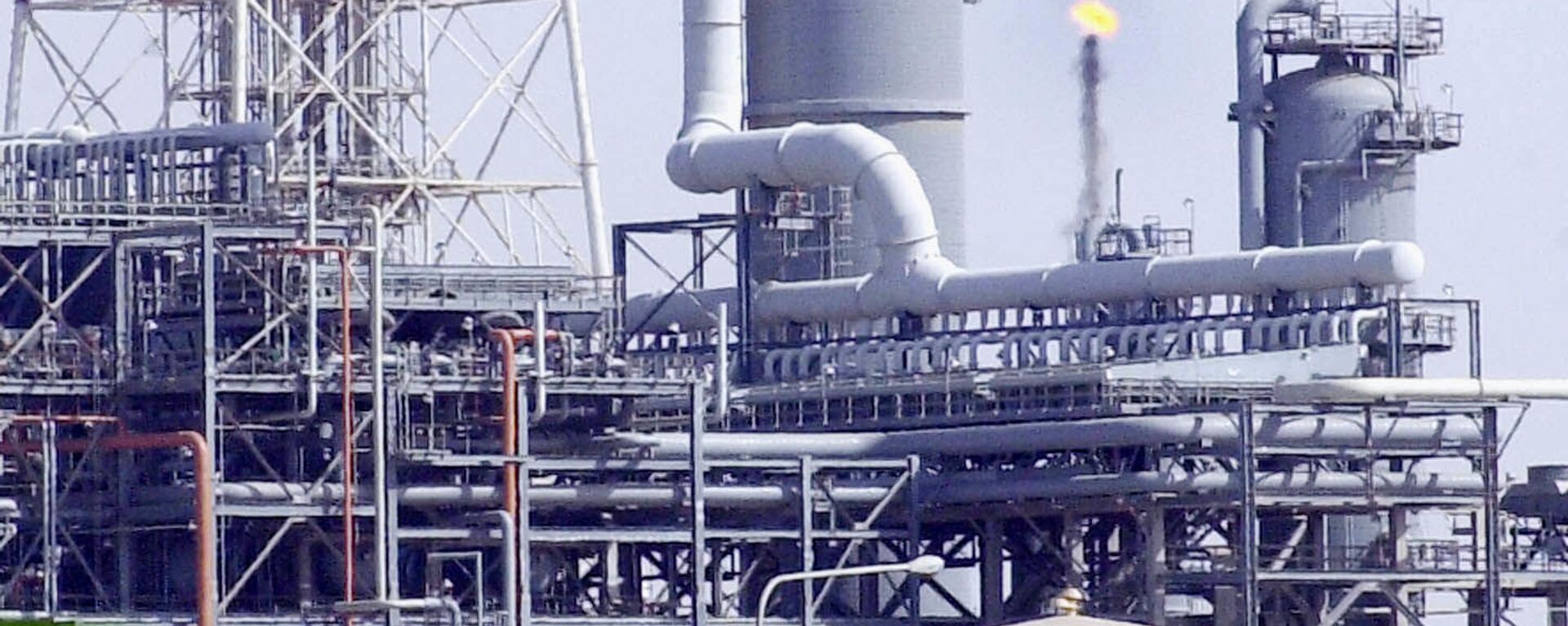https://sputnikglobe.com/20220311/ex-texas-oil-regulator-says-would-take-world-10-years-to-replace-russian-energy-supply-1093762786.html
Ex-Texas Oil Regulator Says Would Take World 10 Years to Replace Russian Energy Supply
Ex-Texas Oil Regulator Says Would Take World 10 Years to Replace Russian Energy Supply
Sputnik International
WASHINGTON (Sputnik) - The international community would need between five to ten years to match the millions of barrels of oil that Russia produces each day... 11.03.2022, Sputnik International
2022-03-11T01:51+0000
2022-03-11T01:51+0000
2022-03-11T02:46+0000
us
crude oil
gasoline
energy supplies
oil prices
https://cdn1.img.sputnikglobe.com/img/107380/41/1073804129_0:263:4831:2980_1920x0_80_0_0_a3b9812b55cabfc07bfc9db955a2d194.jpg
President Joe Biden announced a US-only ban on Russian oil imports on Tuesday in an action aimed at further isolating a country that on its own provides 10 percent of world supply. Russian oil made up a small percentage of US imports last year, according to the Energy Information Administration (EIA), although the move sent crude and gas prices skyrocketing to record highs.The United States, Europe and China are the biggest oil buyers in the world, Sitton said, adding that China may be Russia's only big option now."China in a really good position because China now as Russia's sole customer can almost command whatever prices they want to pay for that oil because there are no other buyers," Sitton said.The United States is reportedly looking at lifting sanctions on Venezuelan and Iranian oil as it seeks to identify alternative supply to Russian energy.Russia produces a lot of heavy and intermediate oils that are needed to run US refineries, Sitton said. The light sweet crude oil produced in Texas is very difficult to utilize in all of the US refining infrastructure, so Venezuelan crude oil would be a very natural replacement for Russian crudes oil, he added.The Western actions against Russia and the conflict in Ukraine will force countries to rethink their energy strategy, Sitton said."I would say it's going to absolutely force countries to rethink their energy strategy," Sitton said. "If you look out in the next month or two, people across the developed world are paying 50 percent more for raw energy than they were just a month ago. That's going to have a real negative impact on economies."Sitton said he believes Western governments were already pressuring big oil and gas companies to no longer purchase Russian crude oil as of two weeks ago.According to Sitton, the US ban on Russian oil imports may result in American consumers paying close to a national average price of $6.00 per gallon for regular gasoline.The US average price of regular gasoline hit two consecutive records Tuesday and Wednesday, according to the American Automotive Association (AAA). The average price of gasoline in the United States increased by eight cents overnight Wednesday, from $4.17 to $4.25 after the US government announced a ban on Russian energy imports a day earlier.Sitton projects other European nations might ban the use of Russian energy as well because of its close proximity to the conflict in Ukraine. There is still going to be enough oil in the world to supply the countries that want it, Sitton said, but the problem is right now all the oil is not going to the right places.Sitton predicts it may take months for energy supply chains to balance out following the US ban on Russian oil imports.In addition, Sitton said it could take the United states three to six months just to produce an extra one million barrels of oil. Increasing US production by three to four million barrels could take a year or two to achieve and that is only with 100 percent government support to ensure plenty of financing and stability in terms of supply chains.Russia provides 10 percent of the world's crude oil needs and 40 percent of Europe's gas requirements. However, the US buys a limited amount of crude and petroleum products from Russia compared to Europe.The United States and its allies have imposed comprehensive sanctions against Russia in response to its special military operation in Ukraine, banning also Russian oil imports. The US House also passed legislation to ban imports of Russian energy products that the Senate took up on Thursday.The sanctions have slowed but not entirely eliminated the ability of Russian exporters of oil and gas to transact deals that require world financial networks and especially US dollars.Let's stay in touch no matter what! Follow our Telegram channel to get all the latest news: https://t.me/sputniknewsus
https://sputnikglobe.com/20220310/fuel-up-food-up-uk-wholesalers-warn-energy-crisis-means-grocery-price-hikes-1093746726.html
https://sputnikglobe.com/20220310/whos-the-pariah-after-snubbing-biden-saudi-aramco-agrees-to-build-massive-refinery-in-china-1093759364.html
Sputnik International
feedback@sputniknews.com
+74956456601
MIA „Rosiya Segodnya“
2022
Sputnik International
feedback@sputniknews.com
+74956456601
MIA „Rosiya Segodnya“
News
en_EN
Sputnik International
feedback@sputniknews.com
+74956456601
MIA „Rosiya Segodnya“
Sputnik International
feedback@sputniknews.com
+74956456601
MIA „Rosiya Segodnya“
us, crude oil, gasoline, energy supplies, oil prices
us, crude oil, gasoline, energy supplies, oil prices
Ex-Texas Oil Regulator Says Would Take World 10 Years to Replace Russian Energy Supply
01:51 GMT 11.03.2022 (Updated: 02:46 GMT 11.03.2022) WASHINGTON (Sputnik) - The international community would need between five to ten years to match the millions of barrels of oil that Russia produces each day, former Texas industry regulator Ryan Sitton told Sputnik.
President Joe Biden announced a US-only ban on Russian oil imports on Tuesday in an action aimed at further isolating a country that on its own provides 10 percent of world supply. Russian oil made up a small percentage of US imports last year, according to the Energy Information Administration (EIA), although the move sent crude and gas prices skyrocketing to record highs.
"How long before the rest of the world can make the ten million barrels of oil that Russia produces? The answer is it is so far off it can't be done," Sitton, a former member of the Texas Railroad Commission, the oil regulator in the United States' top oil-producing state, said. "We're talking five, ten years away before that would even be possible to replace all ten million barrels."
The United States, Europe and China are the biggest oil buyers in the world, Sitton said, adding that China may be Russia's only big option now.
"China in a really good position because China now as Russia's sole customer can almost command whatever prices they want to pay for that oil because there are no other buyers," Sitton said.
The United States is reportedly looking at lifting sanctions on Venezuelan and Iranian oil as it seeks to identify alternative supply to Russian energy.
"It's funny, isn't it, because we have had sanctions in place against Iranian and Venezuelan oil and you sanction the Russian oil and you're almost out of options," Sitton said.
Russia produces a lot of heavy and intermediate oils that are needed to run US refineries, Sitton said. The light sweet crude oil produced in Texas is very difficult to utilize in all of the US refining infrastructure, so Venezuelan crude oil would be a very natural replacement for Russian crudes oil, he added.
The Western actions against Russia and the conflict in Ukraine will force countries to rethink their energy strategy, Sitton said.
"I would say it's going to absolutely force countries to rethink their energy strategy," Sitton said. "If you look out in the next month or two, people across the developed world are paying 50 percent more for raw energy than they were just a month ago. That's going to have a real negative impact on economies."
Sitton said he believes Western governments were already pressuring big oil and gas companies to no longer purchase Russian crude oil as of two weeks ago.
According to Sitton, the US ban on Russian oil imports may result in American consumers paying close to a national average price of $6.00 per gallon for regular gasoline.
"It's very disruptive so it would not surprise me at all if average gasoline prices in the United States go over five dollars a gallon and maybe even start approaching six," Sitton, a former member of the Texas Railroad Commission, the oil regulator in the United States' top oil-producing state, said.
The US average price of regular gasoline hit two consecutive records Tuesday and Wednesday, according to the American Automotive Association (AAA). The average price of gasoline in the United States increased by eight cents overnight Wednesday, from $4.17 to $4.25 after the US government announced a ban on Russian energy imports a day earlier.
Sitton projects other European nations might ban the use of Russian energy as well because of its close proximity to the conflict in Ukraine. There is still going to be enough oil in the world to supply the countries that want it, Sitton said, but the problem is right now all the oil is not going to the right places.
Sitton predicts it may take months for energy supply chains to balance out following the US ban on Russian oil imports.
In addition, Sitton said it could take the United states three to six months just
to produce an extra one million barrels of oil. Increasing US production by three to four million barrels could take a year or two to achieve and that is only with 100 percent government support to ensure plenty of financing and stability in terms of supply chains.
Russia provides 10 percent of the world's crude oil needs and 40 percent of Europe's gas requirements. However, the US buys a limited amount of crude and petroleum products from Russia compared to Europe.
The United States and its allies have imposed comprehensive sanctions against Russia in response to its special military operation in Ukraine, banning also Russian oil imports. The US House also passed legislation to ban imports of Russian energy products that the Senate took up on Thursday.
The sanctions have slowed but not entirely eliminated the ability of Russian exporters of oil and gas to transact deals that require world financial networks and especially US dollars.
Let's stay in touch no matter what! Follow our Telegram channel to get all the latest news: https://t.me/sputniknewsus 




